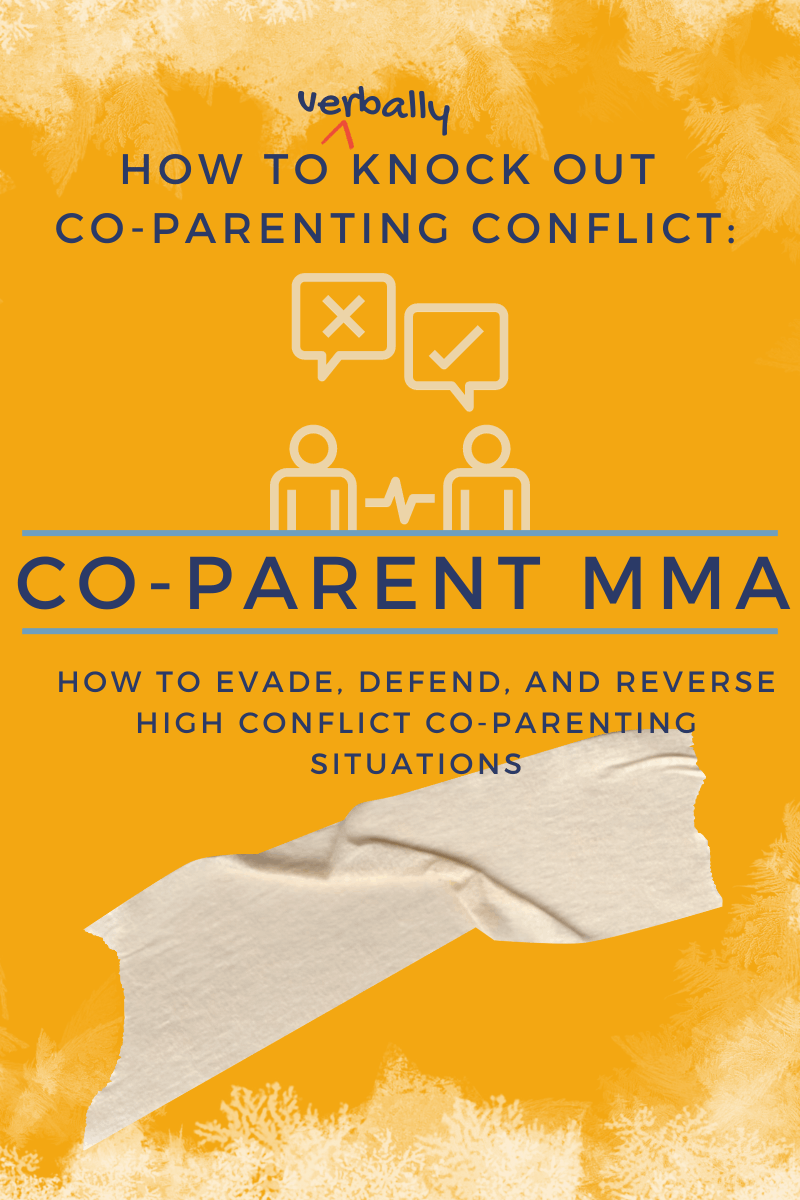How You Can Knock Out Co-Parenting Conflict Using Co-Parent MMA
“We’re not fighting, we are sparring…”
How to evade, defend, and reverse high conflict co-parenting situations.
We all know the old adage, turn the other cheek, but some situations in life demand you take a southpaw position before you even pick up the phone. Unfortunately. This certainly holds true when navigating high conflict co-parenting situations.
Whether it’s verbal fisticuffs, or the 10th round of an unrelenting co-parent battle, there is a resounding feeling that this is the fight of our lives. Even though we are ACTUALLY fighting for other’s lives. Our children’s. Fighting for time with them. Fighting for view of them. Fighting for empathy in co-parenting them without conflict….
Do you see where I’m going with this? It ALL feels like a fight, right?!
Let’s step out of the realm of octagonal co-parenting, where bypassing the final round of a co-parenting scuffle ends in a choked-out phone call. Let’s step into the realm of MMA co-parenting.
Where clashes and co-parenting conflict can arise unexpectedly, co-parenting can resemble intense battles rather than collaborative endeavors. But what if you could shift this narrative? What if, instead of viewing these moments as fights, you reimagined them as sparring sessions—a chance to finesse your communication, deepen your understanding, and emerge stronger? What if you could knock out co-parenting conflict without compromising co-parenting progress?
Let’s check it out.
ROUND #1
Reframing Co-parenting Conflict:
I challenge you to redefine the notion of co-parenting conflict as a sparring match. Read that again…it already feels less personal, right? If you want to reach resolution of a high conflict co-parenting situation in a way that makes our exchanges less, hmm, battle-esque, you can do that by limiting how intense you go into these moments. Pull some punches, if you will.
When co-parenting conflict transforms into strategic engagement, the focus shifts from achieving a victory to seeking comprehension and growth. It's acknowledged that beneath disagreements lie shared intentions for our children's well-being and a desire for effective co-parenting. This shift in perspective allows us to prioritize constructive dialogue, empathetic listening, and collaborative problem-solving, ultimately strengthening the foundation of our coparenting relationship.
Just as in martial arts, where precision and technique often outweigh brute force, in the arena of co-parenting, understanding and mutual growth take precedence over the desire to 'win' an argument. It's an acknowledgment that every co-parenting conflict holds the potential for learning, empathy, and the evolution of our co-parenting journey.
"Courage doesn't always roar. Sometimes courage is the quiet voice at the end of the day saying, 'I will try again tomorrow.'"
- Mary Anne Radmacher
ROUND #2
Evasion Techniques:
If you have ever seen or played any sort of boxing games, you know you need to DUCK! sometimes to evade an incoming attack. Lean left, lean right, off the ropes… you know the story. The most important part is ANTICIPATING the incoming co-parenting conflict, be it a threat, attack, or ambush. If you as striving yet, thriving co-parents can identify potential conflicts early, you can anticipate those incoming conflicts. You can then diffuse incoming high conflict co-parenting situations, and surely avoid direct confrontation.
The potential for things to get out of control quickly can cripple many parents from even standing their ground. Knowing that at some point you are going to have a hard conversation ahead, I encouragingly challenge you to use your mental notebook to feel when there is an incoming attack, as many co-parents can sense when a conversation is going south. Just as martial artists anticipate a competitor’s next move, you too can learn to evade co-parenting conflict.
Let’s look at the non-violent art form, Aikido, also practiced by Steven Seagal, which is the art of taking another person's attack and neutralizing its effectiveness by redirecting it in a peaceful and nonviolent way.
Phew, would I love to learn and teach Verbal Aikido for co-parenting! Imagine, being able to anticipate a tone switch, or note the pace of conversation hastening, or hearing more aggressive language before it’s physically said in the conversation. Then being able to turn-around or reverse these moments to keep cooperation alive! These are fitting examples of anticipating and, just as important, preparing to evade co-parenting conflict.
Think of some of your own personal experiences when you identified potential conflicts with your co-parent early, and how this avoided a high conflict situation. Think about how you can defuse co-parenting disagreements before they escalate to conflict, as done in the style of AIKIDO!
“One must first learn to heal people to be great. To hurt people is easy.”
— Steven Seagal
ROUND #3
On The Defensive:
They say the best way to have a good offense is to have a great defense. Yet being defensive can derail a co-parenting moment as quickly as it can assist it. But you can make certain choices that will be useful in deciphering these “defensive” moments to avoid conflict.
Let’s elaborate and focus on the idea of different defenses. Emphasizing the importance of maintaining composure and offering calm responses during heated moments with a co-parent: *Cue scoff and exaggerated eye roll*… because we all know this step is easier said than done.
Defensive strategies aren't merely about shielding yourself but also about displaying strength through composure and thoughtful responses. When co-parenting conflicts escalate, maintaining a kind defense becomes pivotal. It's not about retaliating or counterattacking but about nurturing a safe space for constructive dialogue and understanding. *None of those who got the last lick in moments*
In the realm of co-parenting, heated moments can test your patience and resilience. The key is to exhibit a kind defense, where maintaining composure and responding calmly become your armor. It's an acknowledgment that your reactions hold the power to either escalate co-parenting conflicts or diffuse them.
By choosing calm and collected responses, you organically create an atmosphere conducive to finding co-parenting solutions rather than deepening rifts.
A kind defense involves empathy and restraint—a deliberate effort to understand your co-parent’s perspective while asserting your boundaries respectfully. It's not a surrender but a strategic choice to prioritize the well-being of your co-parenting relationship and, ultimately, your children.
So, when I say Defensive, I am referring to DEFENDING the importance of maintaining composure and responding with kindness, which turns heated moments into opportunities for constructive communication within the co-parenting dynamic.
"Strength does not come from winning. Your struggles develop your strengths. When you go through hardships and decide not to surrender, that is strength."
- Arnold Schwarzenegger
ROUND #4
Reversal - Turning the High Conflict Coparenting Situation Around:
Turning the tide in intense co-parenting situations demands a multi-faceted approach rooted in empathy, effective communication, and conflict resolution skills. De-escalation and reversal can be seen as synonymous, in that these techniques play a pivotal role in transforming high conflict co-parenting situations into productive discussions that pave the way for understanding and, more importantly, for resolution.
We could all use a little more resolution in our daily co-parenting lives.
Empathetic communication stands at the forefront of this reversal process. It involves actively listening to understand your co-parent rather than simply responding.
*Fighting the urge to interrupt very well may interrupt the urge to fight! -Think about that one for a hot minute. It’s good, right? Now put that on the shelf near muscle memory right across from impulsiveness. Good deal.
Reversals also include acknowledging emotions, validating feelings, and expressing empathy towards your co-parent's perspective. When emotions run high, the power of empathetic communication lies in its ability to diffuse tension and create space for mutual understanding.
*Get your breath, calm your breathing, keep calm…
Be mindful to the conflict resolution methods that become instrumental in reversing intense co-parenting situations towards constructive dialogue. These methods encompass problem-solving strategies, compromise, and a willingness to find common ground. It's not about winning an argument. It’s about arriving at solutions that benefit both parties and, most importantly, your children.
By fostering an environment conducive to empathetic communication and conflict resolution, you can transform the abundance of high conflict co-parenting situations into an abundance of opportunities for growth and strengthened relationships.
"You have power over your mind – not outside events. Realize this, and you will find strength."
- Marcus Aurelius
ROUND #5
Learning and Empowerment:
In life… if you lose, don’t lose the lesson. Within co-parenting conflicts lie profound opportunities for personal growth and mutual understanding. Embracing a sparring mindset in co-parenting conflicts reframes these moments as catalysts for learning and empowerment. It’s far from being as simple as Winners and Losers.
Each high conflict co-parenting situation, when approached with openness and a willingness to understand, presents a chance for personal growth. It's not about avoiding conflict matches, but rather navigating them with a mindset geared towards learning and improvement. These moments offer insights into yourself, into your co-parent, and into the dynamics at play, fostering self-awareness and emotional intelligence.
At times you may need to give a few handicap points if your co-parent comes up short at “the emotional weigh-in.” Meaning they have not shown signs or capabilities to reach this emotional intelligence.
So, before you take the gloves off, remember: a sparring mindset allows for mutual understanding. It encourages viewing co-parenting conflicts as collaborative challenges rather than adversarial battles. Most people that spar in the ring are actually friends, or at least respect one another enough to keep it civil. Through active listening, empathy, and seeking common ground, conflicts with your co-parent become bridges to understanding each other's perspectives and needs along with your children’s.
This understanding forms the cornerstone for effective co-parenting relationships built on respect and cooperation.
It's through these experiences that you empower yourself with the tools to handle future co-parenting conflicts with grace and maturity, fostering a healthier environment for yourself and your children.
"The greatest glory lies not in never falling, but in rising every time we fall."
- Nelson Mandela
THE BELL -- DING-DING!
Amidst the complexities of co-parenting, conflicts often surface. However, by adopting a sparring mentality over a fighting one, you can transform these encounters into avenues for growth, understanding, and enhanced cooperation. Be ready to evade those haymaker moments that can knock the wind out of you. Remember a swift reversal can turn any failing situation positive. Stick and move! And remember the kids will stay in your corner no matter what, so lets ALL go for the win.
"Sometimes the strength within you is not a fiery flame that all can see, it is just a tiny spark that whispers softly, 'You got this, keep going.”
- Charles Narcisse
Charles A. Narcisse
CDC Certified Divorce Transition and Recovery Coach ®
“Just a father focused forward”



